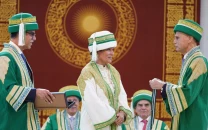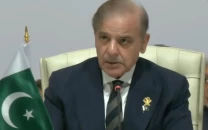Impediments to Pak-BD reconciliation process
Bangladesh and Pakistan differed on resolving contentious issues

Prospects of reconciliation between Pakistan and Bangladesh got an impetus when Pakistan's Deputy Prime Minister and Foreign Minister Senator Ishaq Dar visited Dhaka on August 23-24. It was the first visit of a Pakistani foreign minister to Dhaka in 13 years. During the visit, the two sides agreed to strengthen bilateral relations and resolve issues barring those emanating from the civil war in the then East Pakistan from March-December 1971.
Following the monsoon revolution in Bangladesh in August 2024 leading to regime change, a degree of paradigm shift took place in the Pak-BD relations. Yet, despite apparent warmth in their relations, Dhaka and Islamabad failed to initiate a reconciliation process. Bangladesh, reiterated its stance on an apology from Pakistan over the 1971 alleged atrocities; settlement of assets at the time of division; repatriation of standard Pakistanis (called Biharis); and returning the foreign aid that Islamabad received over the November 1970 cyclone.
In response, Pakistan's foreign minister urged Bangladesh to move on, arguing that the issues raised by Dhaka had been resolved during the tripartite talks involving Bangladesh, India and Pakistan on April 9, 1974. But, caretaker foreign minister of Bangladesh Tauhid Hossain differed with the viewpoint of his Pakistani counterpart and made it clear that resolution of contentious issues remain a major impediment to full normalisation of relations with Islamabad. A similar stance had been adopted by him when Pakistan's foreign secretary had visited Dhaka a couple of months ago.
Bangladesh's Caretaker Chief Executive Dr Muhammad Yunus welcomed the visit of Pakistan's Foreign Minister by stating that "our visions are aligned, and Saarc remains a top priority for both of us I feel our two economies are complementary. There are many areas where we can work together." The statement issued from Dhaka after the conclusion of Dar's visit noted that "the two sides discussed bilateral ties, boosting trade, youth-to-youth exchanges, and revitalizing regional cooperation through Saarc."
A number of MoUs signed by Pakistan and Bangladesh covered wide-ranging issues like agreement on visa exemption for diplomatic and official passport holders; and cooperation between Foreign Service Academies of the two countries as well as between Associated Press of Pakistan and Bangladesh Sangbad Sangestha, and Institute of Strategies Islamabad and Bangladesh Institute of International and Strategic Studies, Dhaka. Under Pakistan-Bangladesh knowledge corridor, Pakistan announced granting 500 scholarships to Bangladeshi students for pursing higher studies in Pakistan during the next five years.
The visit of Pakistan's Commerce Minister Jam Kamal Khan which coincided with Senator Ishaq Dar's visit to Dhaka led to the revitalisation of Pakistan-Bangladesh Joint Economic Commission and enhancing trade through shipping links. The issue of direct flights between Pakistan and Bangladesh was also discussed, but one needs to keep in mind that without India's permission to use its airspace, it may not be possible.
When Bangladesh and Pakistan differed on resolving contentious issues, it means the two sides have a long way to go in order to take the reconciliation process forward. Bangladesh's caretaker foreign minister while giving his country's view on such matters stated, "We acknowledge that the issues of 1971 cannot be solved in a day. We have agreed to continue discussions to the end." Whereas, Pakistan's foreign minister differed with his Bangladeshi counterpart, stating that these issues had already been resolved twice — first, when Pakistan formally recognised Bangladesh in 1974; and then, in July 2002 when the then President Pervez Musharraf had visited Dhaka. But the Bangladeshi side is insistent on the apology issue, settlement of assets, repatriation of stranded Pakistanis and refund of foreign assistance given to Pakistan during the November 1970 cyclone. The last demand is relatively new because earlier Dhaka used to mention only the first three as stumbling blocks.
Pakistan tendering an unconditional apology on the atrocities allegedly committed during the 1971 war is not possible because a counter-narrative on brutalities committed by the Awami League supporters against the Urdu-speaking community and looting of their properties cannot be ignored either. Bangladesh is demanding around 4.5 billion dollars in terms of assets as well as foreign assistance for cyclone victims. Furthermore, on the issue of repatriation of stranded Pakistanis, Islamabad has a firm position that it has already fulfilled its obligations.
Impediments to the Pak-BD reconciliation process is a reality and need to be analysed from three angles.
First is the consistent mindset of the elites of Bangladesh that Pakistan must comply with demands made by Dhaka. Whether it is Awami League or the caretaker government, both follow the same position, listing issues which obstruct the Pak-BD reconciliation process. It means that despite best efforts by Pakistan to pursue a forward-looking approach for strengthening ties with Bangladesh, not much is expected.
The elites of Pakistan believe that the issues pointed out by Dhaka for full normalisation of the bilateral relations with Islamabad were long resolved and the two countries should not get bogged down in the past. Bangladesh is unwilling to accept Pakistan's stance that the two sides should move on despite the unresolved issues. Thus, when the two sides are unwilling to show flexibility in their approach on the four issues, how can the reconciliation process move forward?
Second, the two sides are unable to professionally deal with the issues related to the 1971 war which, according to Dr Yunus, come again and again whenever there is any serious effort for fence-mending. It means there are forces in Bangladesh which want to keep the matters of 1971 alive. What option is then Pakistan left with? Should Pakistan once and for all apologise to Bangladesh for the alleged 1971 atrocities or should it also ask Dhaka to apologise for the massacre of non-Bengalese in 1971?
Finally, if Pakistan is willing to move on, then Bangladesh should not continue to be a hostage to the past — especially in view of the fact that Bangladesh founder Sheikh Mujibur Rahman had, after dropping charges of war crimes against 195 Pakistani POWs, said that Bengalese knew how to forgive. Thus, it is in the interest of Bangladesh to mend fences with Pakistan instead of opening a Pandora's Box of issues.















COMMENTS (3)
Comments are moderated and generally will be posted if they are on-topic and not abusive.
For more information, please see our Comments FAQ